#women in bulgarian history
Text
i was just about to watch this video by Cheyenne Lin
youtube
Avatar and the Wh*te Imagination (or lack thereof)
about the limits of white imagination and how evident it is in the Avatar movies, and it just reminded me that james cameron worked with an ethnomusicologist, Dr Wanda Bryant, to make music for the na'vi because he wanted something that "would sound like nothing we’ve ever heard on earth" then he decided what was made was too otherworldly and decided that their music should just be what white people would call "alien" and ethnic, aka, whatever music exists in African, Asian and Native American cultures (and that was the final result).
Originally there were many influences coming from all over the globe, but when Cameron listened to the demos, he claimed it was too recognisable as well as too 'weird', albeit for white people and just pushed for a more 'down to earth' version. Avatar is evidence of the continuation of generalized exoticism and stereotyping still being a driving force in Hollywood

[IMAGE ID: A screenshot of a segment from the journal entry written by ethnomusicologist, Dr Bryant discussing the process of creating the music for the avatar films that reads:
"In our initial phone conversation, Horner asked me to find unusual musical sounds that “no one has heard before,” by which he really meant sounds not readily recognizable by the average American movie-goer as belonging to a specific culture, time period, or geographical location"
/END ID]
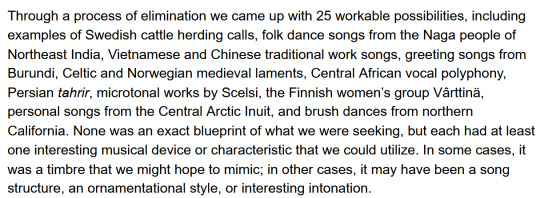
[IMAGE ID: A screenshot of a paragraph from the journal entry written by ethnomusicologist, Dr Bryant discussing the process of creating the music for the avatar films that reads:
"Through a process of elimination we came up with 25 workable possibilities, including examples of Swedish cattle herding calls, folk dance songs from the Naga people of Northeast India, Vietnamese and Chinese traditional work songs, greeting songs from Burundi, Celtic and Norwegian medieval laments, Central African vocal polyphony, Persian tahrir, microtonal works by Scelsi, the Finnish women’s group Vârttinä, personal songs from the Central Arctic Inuit, and brush dances from northern California. None was an exact blueprint of what we were seeking, but each had at least one interesting musical device or characteristic that we could utilize. In some cases, it was a timbre that we might hope to mimic; in other cases, it may have been a song structure, an ornamentational style, or interesting intonation."
/END ID]

[IMAGE ID: A screenshot of a paragraph from the journal entry written by ethnomusicologist, Dr Bryant discussing the process of creating the music for the avatar films that reads:
"Horner then met with Jim Cameron for his input on our musical ideas. Cameron is a very hands-on director and wants to be kept in the loop about all major decisions. Most of the ideas we presented were dismissed by Cameron out of hand, rejected with appropriately blue language as either too recognizable (“Oh, that’s Bulgarian”) or just “too fucking weird!” Half a dozen examples were approved as possibilities."
/END ID]
You can read the full article here:
There is also a video by sideways that discusses this (if you don't want to read):
youtube
#avatar#avatar 2#sorry for the long post i just.... its the avatar hater in me#i hate this racist alien franchise so much#ref#text#film#i wasnt sure whether to put any of this under a cut#but i dont think this is too long ill have to see when it posts#Youtube#music
457 notes
·
View notes
Text
Author Spotlight: Bam Stroker
Today, we're bringing you a special musical guest post from Bam Stroker, author of the current club read Rusalka. Read on to learn more about the music that inspired this erotic retelling of the slavic rusalka myth!
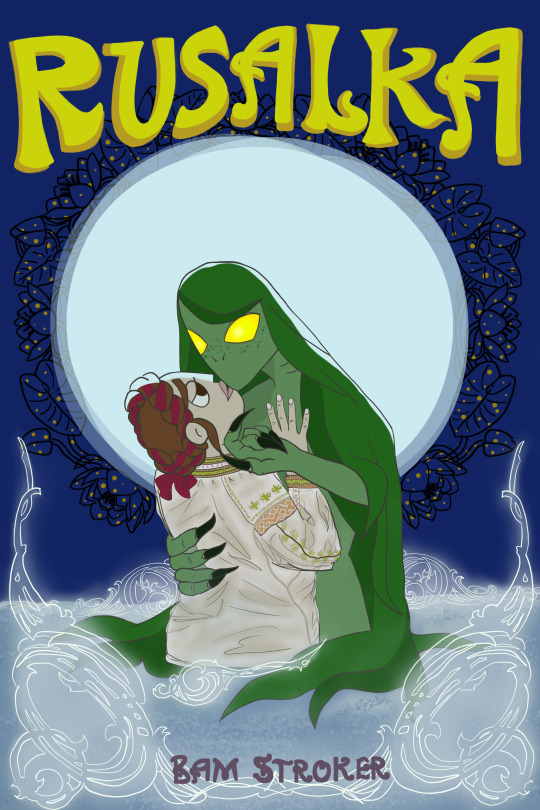
When you think of a lady in a lake, what comes to mind? For me, it’s the haunting trickster of the Rusalka!
Rusalka/Rusalki folklore exists in a pretty far reach, and the folklore for them is fascinating. Most folks will call them the “slavic mermaid”, but that’s not quite right. These ladies do not have fish tails! They hold a history much closer to nixie and nymphs, tied to the land. Until later in time they became associated with women who met their untimely deaths. Usually, by their own doing after losing the love of a man. Where they would then become haunting spirits that would seduce, trick, and drag anyone who dared come by their dwellings to a watery grave.
I first heard about them through the song Rusalka, Rusalka/ Wild Rushes by the Decemberists. When I listened to it, I was absolutely possessed to write a story where a woman runs to the lady of the lake, and instead of death finds love. It’s a setup we all know so well by now, of the historical lesbian gets hitched to a man and runs away to escape it all. And there have been plenty of historical lesbian stories where that escape is usually of the death variety.
Rusalka is a love letter to the complex history of Rusalki, and the stories we have been told about lesbians in history. For once, they both get a fairytale happy ending.
Music is a huge inspiration to me as a writer, especially of the folk variety, and while writing Rusalka I had many different songs on loop throughout the process. The first one is that Decemberists song:
Rusalka, Rusalka / Wild Rushes
While reading the story, music is very present with Sasha singing to the lady of the lake, earning the loving nickname of “Handsome songbird” from her smitten monster. One of the songs hinted at is from the opera Rusalka by Antonín Dvořák. For any Hans Christian Anderson fans out there, you’ll notice the plot of it is very familiar.
Song to the Moon - Rusalka Opera by Antonín Dvořák
Rusalka: “Song to the Moon”
When it comes to folk songs about Rusalki, Kitka’s The Rusalka Cycle: Songs Between Worlds album truly is an amazing inspiration. I’m still on the hunt for Rusalka folk songs, so if you happen to know of any I would be so excited to hear them. In the meantime, here’s a song to set the mood of Sasha’s mad dash to the lake at the start of the story.
To the Lake - Kitka
As far as other music, the songs I had on loop while writing were folk songs from different areas of the region. Le Mystère des Voix Bulgares, volume III, from The Bulgarian State Television Female Choir has got to be the most on loop music of them all though. I can almost hear them in my sleep at this point!
Here are some of those below:
Svatba (The Wedding) - Bulgarian State Television Female Choir
Solo Gousli - Stars of St. Petersburg
Kukułeczka - Mazowsze
Two Guitars - Andreyev Balalaika Ensemble
Echo of the steppes - Ukrainian Bandurist Ensemble
Whether you want to talk about monster folklore, monster fuckery, or have any monster folk songs recs, you can find Bam Stroker on their tumblr! Or if you’d like to peruse their erotic tomes, you can find them on itchio ✨💀✨
#wlw books#booklr#lgbt books#book recs#sapphic books#diverse books#fantasy#paranormal#rusalka#bam stroker#music
25 notes
·
View notes
Text

On this day (Sept 28) in 1943, #German diplomat Georg Ferdinand Duckwitz secretly informed #Danish resistance that the #Nazis were planning to deport all Danish #Jews.
From there, #Denmark became the only #Nazi-occupied country in #Europe to make it a nationwide effort to actively resist the Nazis’ attempt to deport & exterminate its Jews.
The Danes organized to smuggle Jews by sea to neutral #Sweden – this is what made Denmark so unique. There were small numbers of incredible people willing to help save Jews even at great risk in every country, but only in Denmark was it a nationwide effort.
Nearly all of Denmark’s 8,000 Jews lived in #Copenhagen (which certainly made things easier for the Jews and the Danes who wished to help them since it was a mere 20 miles from the Swedish border).
First, the Danish people helped find hiding places for thousands of Jews in homes, hospitals, and churches.
Then, within just a few weeks, in a sort of "mini-#Dunkirk," Danish fishermen began ferrying Denmark’s Jews into Sweden (below).
The Danes managed to get about 7,500 Jews out of the country in time. The other 500 were sent to the #Theresienstadt ghetto in Czechoslovakia.
As a result of the efforts of regular Danish citizens, only 51 Danish Jews out of 8,000 were killed in the #Holocaust – a comparatively miniscule number to every other Nazi-occupied country.
Bulgaria Jews
Need to clarify on #Bulgaria because, sorry, but it does not belong in the same sentence as #Denmark for actions during the #Holocaust.
Yes, there were protests both for and against deportation of Bulgaria’s #Jews to #Nazi death camps, and most Bulgarian Jews survived the war, but the Bulgarian government still voluntarily passed anti-Jewish legislation and sent more than 11,000 #Jewish men, women, and children to their deaths at #Treblinka.
Though not as prevalent as in many other nearby countries, Bulgaria had a history of homegrown antisemitism, racism, and nationalism.
Therefore, even without #German pressure, starting in July of 1940, the Bulgarian government – on its own initiative – passed anti-Jewish legislation excluding Jews from public service, restricting places where Jews could live, & restricting Jewish participation in certain professions. The Bulgarian #racist laws also prohibited marriage between Jews and non-Jews.
Additionally, the Bulgarian government helped identify, register, and mark all of its Jews for the #Germans. Members of the Bulgarian police and Bulgarian military were trained and then used to round up and assemble Jews for “transport East.”
There were also many Bulgarian “Jew-hunters” who hunted down Jews in hiding for the #Nazis.
Then, in early March 1941, Bulgaria joined the #Axis powers and assisted the German-led attack on #Yugoslavia and #Greece. Bulgaria was then permitted by #Germany to occupy most of #Greek Thrace, Yugoslav Macedonia, and Pirot County in eastern #Serbia.
In the spring of 1942, the Bulgarian government commissioned a “Jewish Affairs Commissariat” to handle the deportation of all Bulgarian Jews to Nazi death camps.
Through 1942 and into the spring of 1943, the Bulgarian government continued cooperating fully with the Nazis.
First, Bulgarian officials rounded up and deported all Jewish residents from the territories they occupied in Greece and Yugoslavia. In just March of 1943 alone, Bulgarian officials sent 11,343 Jews to their deaths at Treblinka.
However, when news of the imminent deportations of Bulgarian Jews reached the capital, opposition politicians, Bulgarian intellectuals, and members of the Bulgarian clergy openly protested deporting any Jews from the core provinces of Bulgaria. They managed to delay the deportations.
However, in June of 1943, the Bulgarian government decided to expel 20,000 Jews from Sofia to the provinces, and Bulgarian police brutally suppressed protestors.
In just two weeks, the Bulgarian authorities expelled 20,000 Jews to the Bulgarian countryside where all males were put into forced-labor camps. Bulgarian authorities also confiscated most of the property of the 20,000 deported Jews. Nonetheless, most Bulgarian Jews at least ended up surviving the war.
But, after the war, Bulgarian Jews did not feel welcome any longer and wished to return to Eretz Israel.
By 1950, nearly all the pre-war 50,000 Bulgarian Jews had made Aliyah and immigrated to Israel.
The Zionist longing to immigrate to Eretz Israel was strong among Bulgarian Jews, and many attempted to flee for #British Mandate #Palestine before and during the War.
For a time, Bulgaria permitted its Jews to immigrate to British Mandate Palestine; however, the British enforced their illegal White Paper of 1939 and closed the doors to Jewish immigration throughout the entirety of the War.
So, just after the war started, on Sept 2, 1939, when a ship with 1,400 Jewish refugees from Bulgaria, #Poland, #Romania, and #Czechoslovakia landed at #TelAviv, British soldiers met them with guns and shot and killed two of them.
After that, the British Foreign Office warned Bulgaria that if it allowed any further ships of Jewish refugees to British Mandate Palestine, the British will “expect the Bulgarian government to take the immigrants back.”
But in November of 1940, a ship called the Salvador, set out from Varna, Bulgaria with 200 Jewish refugees – including 70 children – on board.
Shortly thereafter, on Dec 12, 1940, the Salvador sunk in the Sea of Marmora. There were no survivors, and all 200 Jewish refugees drowned.
Captain Allen
29 notes
·
View notes
Note
Hi! I'm trying to research slavic mythology, especially the afterlife, and I've come across a place called Prav but i haven't found much information on it as a whole, i was wondering if you had any information on it
Hello!
To the best of my knowledge the idea that the cosmos separates into Prav, Yav and Nav comes from The Book of Veles, a famous forgery pretending to describe pre-Christian Slavic history and religious customs.
I don’t think I’ve ever seen Prav (or Yav) discussed more broadly outside of that context. However the word Nav/Navia does have real cultural background as a term used for to describe spirits of the dead.
Linguistic evidence implies that the early medieval Slavs may have shared a belief in some form of spirit or soul. In discussing these notions, various scholars point towards the word nav/nawie. This term is sometimes seen as being of pre-Slavic origin, and it is derived from Pre-Indo-European cultural heritage and refers to ‘death’ or ‘corpse’. It holds similar meaning in some of the contemporary Slavic languages, although in various (but not all) languages of the Slavs one may observe a shift in its meaning, whereby it refers to the sphere of demonology. For example, in eastern Polish dialects there are various names for rusałki, forest or water demons: mawki, mauki, nawki, miawki, mauki, mavky, niavky, majki. Another term for the spirits of the ancestors, which is also attributed an ancient origin, is lalka (lelka, łątka). It is noteworthy that after death the human soul went to the land of the dead, whose name is reconstructed as Nawia or Lala. (…)
We know very little about the Slavic land of the dead. I have already mentioned that the words nav/nawie, known from textual accounts, referred to dead people or their ghosts and occasionally (in later times) malevolent spirits. The late medieval textual accounts from the Czech area confirm that Navia was the name of the land of the dead among the Western Slavs. ‘To go to Navia’ meant to die and ‘to prepare someone for Nav’, meant to kill
- Slavic Journeys to the Otherworld. Remarks on the Eschatology of Early Medieval Pomeranians by Kamil Kajkowski
A mention of navias can even be found in the Tale of Bygone years, where they serve as a personification of the plague that fell on the town of Polotsk in 1092.
Something very strange occurred in Polotsk, a hallucination: there was a noise during the night: demons were running through the street like people. If anyone came out of their house to look, they were immediately and invisibly wounded by the demons, and died of it, and they did not dare leave their houses. Then they began to appear during the day on horseback, and they themselves could not be seen, but only their horses’ hooves were visible. And this is how they wounded the people of Polotsk and of the region. And this is why the people said: “Navias (навие) are slaying the people of Polotsk”.
- Tale of Bygone Years as found in Sources of Slavic Pre-Christian Religion, red. Juan Antonio Álvarez-Pedrosa
Andrzej Szyjewski in Religia Słowian explores some more cases of navias appearing as malevolent spirits in Slavic folklore, citing bulgarian „twelve nawi”, evil spirits that suck the blood of lying-in women and bring diseases as well as broader Southern Slavic belief in navije/navje, bird-shaped spirits harassing women during pregnancy and in childbirth.
Overall, as you probably can guess I highly recommend reading „Slavic Journeys to the Otherworld. Remarks on the Eschatology of Early Medieval Pomeranians” and then continuing your search from there.
70 notes
·
View notes
Note
Hi!!! I'm fairly new here so I'm not sure if this has been discussed but I'd love to see your take on the relationship between BulRo during Bul's empires. Do you have headcanons for it?
anon I'm SO SORRY for this being late, life's been crazy lately
I do, I do! I haven't discussed it before though. But here is a short list, trying to potentially stave off spoilers for Rose-Hearted.
Please take in consideration that I am not a historian and my headcannons should be taken as what they are: Mere headcannons, not actual commentary on medieval history and entity dynamics.
[Also bear in mind that in my verse Romania is a woman. It's my nationverse and I get to pick my women]
● In the First Bulgarian Empire, Dimitar didn't interact a lot with Antonia [Romania]. Romanians weren't mentioned a lot in the First Empire, and there's little information available on the inter-relations of Bulgarians and Romanians. I imagine that Antonia, unhappy with her situation, would draw herself away and do her own things.
•I think that Dimitar would try to approach her though! Get to know her a bit better. He'd often bring her little gifts that he made himself — flowers from his garden, woodcarvings of small animals (My headcannon is that Dimitar enjoys wood-carving) she likes. Antonia is always polite with him, but isn't exactly sure if she trusts Dimitar fully.
•As Dimitar becomes stronger and more confident in his abilities, he also becomes more confident in communicating with others and isn't as shy or timid with Antonia. He has accepted that Antonia has her doubts of him, but he'd try to befriend her regardless.
•Unintentionally, he rubs off on her and she grows more confident as time passes. She discovers her own passions and hobbies — she develops an interest in the occult, magic and folklore, which leads her into hours of research.
•Dimitar bonds with Antonia over a shared interest in folklore; he tells her stories of the Bulgars and Slavs, and she records them. Antonia, in return, tells stories of her mother, Dacia's accomplishments and adventures, as well as Roman mythology.
•In the end, during the First Empire they don't exactly interact a lot, but when they do, they're amicable. Antonia bonds with Dimitar overtime, but still keeps a fair amount of distance.
•When the First Bulgarian Empire was conquered by the Byzantine Empire and turned into a Theme (essentially a province), Dimitar, as the representative, was captured and taken to the Byzantine court. Antonia, having fallen under the Byzantine sphere of influence, stayed behind, but had to stay subservient to the Empire, as many other nations. During that time, she continued her research on folklore while also sending letters to Dimitar, detailing her daily life and expressing disdain for "that arrogant man-child with the purple cloak".
>It was also at that time where Antonia and Miroslav (Serbia) actually befriended each other, due to being at similar situations.
•Like I said, she'd send Dimitar letters. LOTS of them. She'd also include drawings she made, of various things: Mostly scenery, but also portraits. She found herself missing Dimitar.
•The Second Bulgarian Empire was marked by more interactions between Bulgarians and Romanians (known as Wallachians or Vlachs then). Indeed, the revolution against the Byzantine Empire that resulted in the creation of the SBE was started by three Romanians (Asan, Kaloyan and Peter).
•After Dimitar returned from captivity, he and Antonia grew closer. Antonia became more assertive when it involved political matters and she often advised Dimitar. The SBE soon became the dominant entity in the Balkans, defeating the Romans multiple times.
•It was then that Antonia realized she had feelings for Dimitar, but soon pushed them away in order to focus on her own life. Mainly, getting her own state and no longer relying on anyone else for her people's existence and well-being.
•The Mongol Invasions ended Cuman influence and weakened Hungary, which gave Antonia an opportunity to call for unification and the creation of an independent state. Even when she left Dimitar's side, she never stopped sending him letters offering advice and generally talking.
•Dimitar kept all her letters. Even through Ottoman times, when he tended to his garden, he'd keep the most beautiful flowers and name them after her. Yes I headcannon him as sappy, crucify me.
#historical hetalia#hws bulgaria#hws romania#hetalia#balkantalia#hetalia headcanons#also bi4bi bulro canon
12 notes
·
View notes
Text
youtube
(Video contains flashing lights increasing in intensity about the 1 minute mark)
After a week of voting, Vesna will represent Czechia in Eurovision with "My Sister's Crown."
This track has lyrics in English, Czech, Bulgarian, and Ukrainian. A mix like that can sometimes be chaotic, but here it feels like it fits. The song is about solidarity between women and the mix of languages and the bandmates' nationalities serves to reinforce the point. The chorus is operatic while the english verses are more conversational, and the Bulgarian verse is rap. Again, the mix of singing styles works to complement the solidarity message. The English lyrics can be a little clunky sometimes, but honestly it comes across more as poetic license being somewhat lost in translation than a lack of originality or failure to make English work for the song. I'm inclined to give it a pass. There is a lot going on here which seems like it shouldn't work, yet somehow does.
The staging for ESCZ was hampered by the studio. So I think only a few pieces of this performance (some of the choreographed cues, the group's musicians sticking with their instruments) will make it to Liverpool. I think costumes will likely be more similar to the music video which combined aspects of traditional dress with doll-like aesthetics for a very stylized look. It would have looked completely overdone in that little studio alongside much more low key performances, but could work on the big stage with Eurovision's history of much more out there presentations. They will also have a LED where they can project visuals that can help place the audience in their world. If they clean up in the right places, this can be extremely striking and get voters' attention. There is also the chance of it devolving into an absolute mess. We will have to wait to see how the team puts this all together in May.
10 notes
·
View notes
Photo
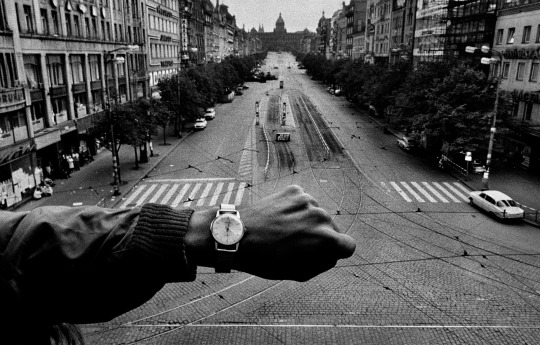
Photo: Josef Koudelka
* * * *
It’s important to say what hope is not: it is not the belief that everything was, is, or will be fine. The evidence is all around us of tremendous suffering and tremendous destruction. The hope I’m interested in is about broad perspectives with specific possibilities, ones that invite or demand that we act. It’s also not a sunny everything-is-getting-better narrative, though it may be a counter to the everything-is-getting-worse narrative. You could call it an account of complexities and uncertainties, with openings.
“Critical thinking without hope is cynicism, but hope without critical thinking is naïvete,” the Bulgarian emigre writer Maria Popova recently remarked. And Patrisse Cullors, one of the founders of Black Lives Matter, early on described the movement’s mission as to “Provide hope and inspiration for collective action to build collective power to achieve collective transformation, rooted in grief and rage but pointed towards vision and dreams.” It’s a statement that acknowledges that grief and hope can coexist.
The tremendous human rights achievements—not only in gaining rights but in redefining race, gender, sexuality, embodiment, spirituality, and the idea of the good life—of the past half century have flowered during a time of unprecedented ecological destruction and the rise of innovative new means of exploitation. And the rise of new forms of resistance, including resistance enabled by an elegant understanding of that ecology and new ways for people to communicate and organize, and new and exhilarating alliances across distance and difference.
Hope locates itself in the premises that we don’t know what will happen and that in the spaciousness of uncertainty is room to act. When you recognize uncertainty, you recognize that you may be able to influence the outcomes—you alone or you in concert with a few dozen or several million others. Hope is an embrace of the unknown and the unknowable, an alternative to the certainty of both optimists and pessimists. Optimists think it will all be fine without our involvement; pessimists take the opposite position; both excuse themselves from acting. It’s the belief that what we do matters even though how and when it may matter, who and what it may impact, are not things you can know beforehand. You may not, in fact, know them afterward either, but they matter all the same, and history is full of people whose influence was most powerful after they were gone.
There are major movements that failed to achieve their goals; there are also comparatively small gestures that mushroomed into successful revolutions. The self-immolation of impoverished, police-harassed produce-seller Mohamed Bouazizi on December 17, 2010, in Tunisia was the spark that lit a revolution in his country and then across northern Africa and other parts of the Arab world in 2011. And though the civil war in Syria and the counterrevolutions after Egypt’s extraordinary uprising might be what most remember, Tunisia’s “jasmine revolution” toppled a dictator and led to peaceful elections in that country in 2014. Whatever else the Arab Spring was, it’s an extraordinary example of how unpredictable change is and how potent popular power can be.
You can tell the genesis story of the Arab Spring other ways. The quiet organizing going on in the shadows beforehand matters. So does the comic book about Martin Luther King and civil disobedience that was translated into Arabic and widely distributed in Egypt shortly before the Arab Spring. You can tell of King’s civil disobedience tactics being inspired by Gandhi’s tactics, and Gandhi’s inspired by Tolstoy and the radical acts of noncooperation and sabotage of British women suffragists. So the threads of ideas weave around the world and through the decades and centuries. There’s another lineage for the Arab Spring in hip-hop, the African-American music that’s become a global medium for dissent and outrage; Tunisian hip-hop artist El Général was, along with Bouazizi, an instigator of the uprising, and other musicians played roles in articulating the outrage and inspiring the crowds.
Mushroomed: after a rain mushrooms appear on the surface of the earth as if from nowhere. Many do so from a sometimes vast underground fungus that remains invisible and largely unknown. What we call mushrooms mycologists call the fruiting body of the larger, less visible fungus. Uprisings and revolutions are often considered to be spontaneous, but less visible long-term organizing and groundwork—or underground work—often laid the foundation. Changes in ideas and values also result from work done by writers, scholars, public intellectuals, social activists, and participants in social media. It seems insignificant or peripheral until very different outcomes emerge from transformed assumptions about who and what matters, who should be heard and believed, who has rights.
Ideas at first considered outrageous or ridiculous or extreme gradually become what people think they’ve always believed. How the transformation happened is rarely remembered, in part because it’s compromising: it recalls the mainstream when the mainstream was, say, rabidly homophobic or racist in a way it no longer is; and it recalls that power comes from the shadows and the margins, that our hope is in the dark around the edges, not the limelight of center stage. Our hope and often our power.
--from the 2016 introduction to Hope in the Dark. Photo: Josef Koudelka, Warsaw Pact troops invade Prague, In front of the Radio Headquarters, Prague, Czechoslovakia, August 1968
[Rebecca Solnit]
18 notes
·
View notes
Note
Who has been the best influence on Lizzy in her life? Who is the worst?
1. Klaus (affectionate)
2. Klaus (derogatory)
No I tell you what, the whole Mikaelson Household as a military UNIT around this girl has been a very crucial influence on Lizzy's self esteem, her endurance, and her worldview. Moving as a collective entity much like the Addams family (snap snap), if one adult is daggered, the other one is f r e e. And a l l of them in one way or another has fed into raising this child to be so much stronger than she f e e l s in her darkest hour.
Aside from El Bastard Numero Uno, the headline figure for Better and Worse in Lizzy's life has been Rebekah. Lizzy's mom is strict, she tells her n o, and doesn't let her come with Elijah to watch scraps with Marcel in the Quarter. Boo. The wooden spoon is the reason Lizzy has A MODICUM OF SELF RESTRAINT. Not Klaus. The Spoon.
But Rebekah?
Lets not fucking forget she pioneered feminism before it was even CONCEIVED. Well behaved women seldom make history.
Lizzy has watched her talk back, snap necks, cash cheques, wear the pants, get advanced, do her dance, and fuck right the hell off on her own agenda for all of three minutes between the door and the dagger straight into the coffin. A nightmare of an influence on a little girl who was supposed to learn not to BITE. The girl who loved too hard. Lizzy learned to argue from her auntie.
Klaus is a problem for several reasons, but half of those are because if he sees fit, Lizzy's ego will absolutely go completely fucking unchecked. As long as the act is justified or entertaining, Lizzy could probably massacre a whole t o w n and Klaus would get on his sacrifice altar and tell people to fuck off and let her express her creativity. Which? Has since confused her because sometimes the same massacre is n o t okay when he's not in the mood for it.
If you want to talk about really- the b e s t influence, we're going to look at Stefan Salvatore, right there in tandem with Elijah.
He probably has one of the most m e a s u r e d and considerate approaches? To influencing Lizzy's lifestyle, and her frame of m i n d. I think he's been an absolute breathe of fresh air in the way he reaches out to her with a calm and gentle demeanor, and he makes the compassionate angle look inviting rather than exhausting. Lizzy could see herself be kind to people in the Stefan way without throwing UP, which is new, given that she used to be allergic to saying the word SORRY. Elijah is remarkably similar, he's such a graceful and immovable force, that can take the most frantic of storms and s o o t h e them, and command a r o o m. Or a Quarter. There's something of Elijah in Lizzy's stage presence.
More recently Katherine has managed to invite Lizzy into this world of more humble stances, taking great care to appreciate the little things in life that she never really got to touch on in a mansion run like a palace. Lizzy has absolutely adored discovering her Bulgarian roots, and that sort of human softness has really resonated with her.
Last but not LEAST but also least because it's Damon, DAMON.
Lizzy's exposure to Dad isn't nearly as full on as it is with Katherine and Stefan, and we don't actually DISCLOSE how much time she's quietly spent having a heart to heart with him, because it would RUIN THEIR IMAGE. But he's something of a grounding reality check.
While everyone else is very rigid and caught in their personal journey through life, Damon has this way of cutting through the curtains and smoke screens, and giving Lizzy an objective overview of w h a t the problem really looks like.
That's not to say he doesn't twist it!
Of course he does, he's got more opinions than a... thing with a lot of opinions.
But he's v e r y good at chopping up a confusing situation into smaller pieces, and laying them out on the table for Lizzy to r e a l l y have a good look at. And he really might be one of the very few who wants to see Lizzy take the steps h e r s e l f. Because what does it matter to him, which direction she chooses? It seems that as long as the result doesn't directly impact h i m, she's allowed to go her own w a y.
And more often than not he has a habit of saying the thing she was thinking, out l o u d. It's how she really trusts that she's h i s.
Lizzy's List Of Honorable Mentions:
Snoop Dogg, he told her once that in this industry you have to watch what you tell people, watch your words, don't say a damn thing publically when you're heated. Shut the fuck up and sit down and write it in a draft first before you set fire to your career. He pops into her head every time she wants to f i g h t.
Nero, her pet Scorpion, taught her that no matter how big and scary the animal looks, it will probably like treats. See: Klaus.
Nugget, of course has taught Lizzy about responsibility and unconditional love! You know, it doesn't matter how hard she's crying, he doesn't walk a w a y. The man's committed.
Jeremy Gilbert, is the first b o y she really got emotionally close to, and has taught her how she wants to handle the relationship landscape, because she hasn't been cornered, controlled, or restricted. Her little self assured personality really doubled when he took a shine to it.
Courtney Lawrence, the Patsy Stone to her Eddie Monsoon. If there was a drug, she fed it to her and said IT'S FINE SWEETIE IT'S ALL THE LATEST. If there was a party to sneak out to, she's driving the c a r. Her Yes-Woman.
Lizzy takes little things from every single person in her l i f e. There is nothing she is not willing to learn, and she's adapting and changing herself c o n s t a n t l y.
#the wooden spoon in the kitchen scares lizzy more than a wolf bite thanks for coming to my ted talk
2 notes
·
View notes
Text

katherine and work/jobs/career?? i’m curious if she ever felt like working and if she had any gigs going on → requested by @tobeblamed
katherine grew up privileged and if things had developed as expected, katherine would have married into a good family, been head of the household, taken part in her husband's interests, and of course, get children. for a short time, it even looked as if, despite the circumstances, this would actually become her task when lord niklaus started courting her.
then, katherine fled and turned into a vampire and the concept of 'matriarch', 'head of houshold', or even 'work' was no longer a possibility nor needed. if katherine wanted something, she didn't need to 'work' for it, she could just compel it. constantly fearing that she needs to flee and being paranoid also prevent her from settling down somewhere.
so what does katherine do in her free time? she can't be running all the time, after all.
well, for starters katherine is mostly busy with scheming and keeping track of things that might be a danger to her (aka knowing klaus's current whereabouts). she's an incredibly well-informed person about most things. but those aren't the only things katherine occupies herself with.
in fact, katherine learned many languages. it's a necessary skill for survival and blending in. she can speak and write in bulgarian, english, french, german, russian, spanish, and italian. katherine is also really ambitious hence why she trained her pronunciation until she has no noticeable accent. besides this languages, she speaks/understands bit of czech and latin, mainly because she needs this to understand spells.
speaking of spells, katherine is no witch but she has discovered that it's quite advantageous to understand grimoires and spellbooks. she even has memorized some important spells in case she needs a witch to enchant something for her (she usually asks young, unexperienced ones because they're easier to blackmail).
katherine also learned how to play the piano although she's only an occasional player and never does it in front of people.
another thing that katherine does is collect interesting stuff. she has several (small) warehouses in europe and north america where she collects things that are pretty or once belonged to her. for example, katherine has a few of her original baroque dresses stored there as well as incredibly pricy jewelry gifted to her. the things she keeps there are incredibly valuable.
but no, katherine has no actual 'work' or even 'job'. she also has no desire to 'work'. she wouldn't even be fit for being a waiter or something like that because a) it would be below her and b) it would bore her incredibly fast. don't tempt her into poisoning your coffee, lol.
katherine is, however, potentially interested in studying. women were not allowed to study for a long time so that's kinda a 'new option' to her. katherine probably won't achieve a degree though because she lacks patience with essays, assignments, master theses, and stuff. it's also difficult to find anything that truly interested her. katherine can't stand numbers and calculations but things like history and politics are partly incredibly boring because she mostly literally had been there.
if katherine is ever going to be persuaded into a 'career', it needs to be something that's mentally challenging. that woman is incredibly smart and therefore easily bored.
3 notes
·
View notes
Text
Not everyone can say they’ve been to the Big Apple, but [ DESISLAVA SAXE-COBURG ], a [ 36 ] year-old [ CIS WOMAN ] has lived in [ WEST VILLAGE, MANHATHAN ] for [ ALL HER LIFE ]. This is the city of dreams and [ SHE ] knows it, because they came to NYC to be a/n [ LAWYER ]. Living in the city means they meet all kinds of people, but everyone always seems to think they look like [ TROIAN BELLISARIO ]. They even got away with free cab fare once because of it!

TW: DRUGS, ALCOHOL. CAR CRASH, CHEATING, FAKE DATING
Desislava had never been an ordinary girl. Born in New York, in the family of Kaloyan Saxe Coburg, Knyaz of Turnovo, and Elizabeth Wilson, she was going to be an successor of the Bulgarian throne, if her grandfather Tsar Petar wasn’t abdicate in 1945 and Bulgaria became a republic. But even when she wasn’t going the rule the country, she and her sisters were raised as royals since the rest of the world still accepted them as royals, and because of the fact they still was in the line of the successors of British throne since their grand father was forth cousin of queen Elizabeth II.
Desislava, as Knyaginya of Turnovo, didn’t have exactly carefree childhood. Yet, she was born with a silver spoon in her month, but this came with relevant responsibilities - she had to learn bulgarian and french before she even started elementary school, attending different dancing classes, and studied Bulgarian and world history in every free minute and this continue until her teen years, when she finally raise her voice and call it it quit, wanting to be a normal girl. Her parents wasn’t happy about it but at the end they didn’t have any other option but agree with her, hoping it would be just a phase and she would remember her responsibilities as Knyaginya.
Finaly being able to live as an ordinary girl, Desislava was able to do whatever other oeople her age did - she started going out more often, had different friends most of which was not the best company parents wanted for their kids. The money of Saxe-Coburg family had attractive force for any freeloader who were able to do anything to be around somebody famous and rich. Soon the young Knyaginya started to downfall - the parties she attended became more wild surrounded by a lot of drugs and alcohol. Pictures of these parties started appear regularly in the tabloids and Desislava became a hot topic. Kaloyan and Elizabeth did everything possinble to cover the stories but when Desislava and her best friend became a reason for a huge car crash luckily no casualties, Saxe Coburgs had to do something and they sent the oldest Knyaginya to a rehab at UK and then for a year in Bulgaria where desislava had the opportunity to think a lot about her life and her role in the Bulgarian royal family realizing how much this meant to her but also that she needed to do something more with her life and when she returned to USA she started study law at Columbia University. Along with her education, she also took her role as Knyaginya of Bulgaria seriously becoming a face of few charitable organisations.
Desislava met Aaron, a son of investment banker, when she was 30 and they started dating.They was like a dream couple abd few years later Aaron proposed and she was happy to say “yes”. The newly engaged couple was favorite to tabloids and they followed them around but Desislava didn’t mind to show their love being sure they could be inspiration for other people, But it seemed the happy fairtail was not going to last long. The poltical crisis in Bulgaria and the fact the court gave back some of the lands in Bulgaria to Kaloyan led to some death threat to the whole royal family and they were forced to hire security guards. Desislava was not happy because it took away her freedome especially since she couldn’t stand her guard Alexander which seemed mutual, Her only consolation was her fiance but everything fell apart when one late night she came home only to found Aaron with another women in their own bed. Not knowing how to handle it, Desislava ran away only with Alexander by herself and she didn’t even know how she ended up in Las Vegas, but more more surprising was her marriage to Alexander.
Wanted connections:
best friends
partying buddies ;; a friendship that relies on nothing more than going out and having a wild time
assistant;; someone who could help her with her work and also the charities she works on.
frienemies ;; they’re nice to each others faces and act like friends but are constantly talking badly about each other
friends turned enemies ;; they have been pretty close, but something changed and they couldn’t stand each other
exes ended on bad terms
exes ended on good terms
neighbour ;; they could live next door, across the street. maybe they hang out? maybe not? maybe there is some attraction, maybe they just find each other annoying?
a new friends;; people Desislava recently met but they are pretty close
casual hook up ;; they aren’t friends, but will call each other whenever they need a lil sexual intercourse. basically like a booty call.
relatives of her husband ;; family, friends, ex-lovers; it’s going to be interesting interaction so plese give it to me
co-workers
gym-buddy
a sibling she had no idea about - could be on her mother or her father side
4 notes
·
View notes
Photo

FULL NAME: Desislava Saxe-Coburg
NICKNAMES: Desi, Des. D
PRONOUNS AND GENDER: she/her, cis woman
SEXUALITY: Bisexual
HOUSING: Coral coast
OCCUPATION: Attorney at Fairford law
TRIGGER WARNING(S): DRUGS, ALCOHOL, CAR CRASH, CHEATING, FAKE DATING
ABOUT:
Desislava had never been an ordinary girl. Born in New York, in the family of Kaloyan Saxe Coburg, Knyaz of Turnovo, and Elizabeth Wilson, she was going to be an successor of the Bulgarian throne, if her grandfather Tsar Petar wasn’t abdicate in 1945 and Bulgaria became a republic. But even when she wasn’t going the rule the country, she and her sisters were raised as royals since the rest of the world still accepted them as royals, and because of the fact they still was in the line of the successors of British throne since their grand father was forth cousin of queen Elizabeth II.
Desislava, as Knyaginya of Turnovo, didn’t have exactly carefree childhood. Yet, she was born with a silver spoon in her month, but this came with relevant responsibilities - she had to learn bulgarian and french before she even started elementary school, attending different dancing classes, and studied Bulgarian and world history in every free minute and this continue until her teen years, when she finally raise her voice and call it it quit, wanting to be a normal girl. Her parents wasn’t happy about it but at the end they didn’t have any other option but agree with her, hoping it would be just a phase and she would remember her responsibilities as Knyaginya.
Finaly being able to live as an ordinary girl, Desislava was able to do whatever other oeople her age did - she started going out more often, had different friends most of which was not the best company parents wanted for their kids. The money of Saxe-Coburg family had attractive force for any freeloader who were able to do anything to be around somebody famous and rich. Soon the young Knyaginya started to downfall - the parties she attended became more wild surrounded by a lot of drugs and alcohol. Pictures of these parties started appear regularly in the tabloids and Desislava became a hot topic. Kaloyan and Elizabeth did everything possinble to cover the stories but when Desislava and her best friend became a reason for a huge car crash luckily no casualties, Saxe Coburgs had to do something and they sent the oldest Knyaginya to a rehab at UK and then for a year in Bulgaria where desislava had the opportunity to think a lot about her life and her role in the Bulgarian royal family realizing how much this meant to her but also that she needed to do something more with her life and when she returned to USA she started study law at Columbia University. Along with her education, she also took her role as Knyaginya of Bulgaria seriously becoming a face of few charitable organisations.
Desislava met Aaron, a son of investment banker, when she was 30 and they started dating.They was like a dream couple abd few years later Aaron proposed and she was happy to say “yes”. The newly engaged couple was favorite to tabloids and they followed them around but Desislava didn’t mind to show their love being sure they could be inspiration for other people, But it seemed the happy fairtail was not going to last long. The poltical crisis in Bulgaria and the fact the court gave back some of the lands in Bulgaria to Kaloyan led to some death threat to the whole royal family and they were forced to hire security guards. Desislava was not happy because it took away her freedome especially since she couldn’t stand her guard Alexander which seemed mutual, Her only consolation was her fiance but everything fell apart when one late night she came home only to found Aaron with another women in their own bed. Not knowing how to handle it, Desislava ran away only with Alexander by herself and she didn’t even know how she ended up in Las Vegas, but more more surprising was her marriage to Alexander.
The marriage brought a lot of attention and the new couple as well the whole royal family had to deal with, It was like a nightmare for Desislava and she decided she had to leave New York. “Knyaginya Desislava and her husband Alexander decided to took few weeks off and would spend their honeymoon at Alexander’s home town Fairford" said the message send to the press by the royal family but it was a lie since the new family continue to hardly stand each other but the town seemed like a good place for Desislava to spend some time away from the tabloids. But once Desislava came in the small town she felt in love with the place and she decided she wanted to stay permanently
WANTED CONNECTIONS:
- best friends
- partying buddies ;; a friendship that relies on nothing more than going out and - having a wild time
- assistant;; someone who could help her with her work and also the charities she works on.
- frienemies ;; they’re nice to each others faces and act like friends but are constantly talking badly about each other
- friends turned enemies ;; they have been pretty close, but something changed and they couldn’t stand each other
- exes ended on bad terms
- exes ended on good terms
- neighbour ;; they could live next door, across the street. maybe they hang out? maybe not? maybe there is some attraction, maybe they just find each other annoying?
- a new friends;; people Desislava recently met but they are pretty close
- casual hook up ;; they aren’t friends, but will call each other whenever they need a lil sexual intercourse. basically like a booty call.
- relatives of her husband ;; family, friends, ex-lovers; it’s going to be interesting interaction so plese give it to me
- co-workers
- gym-buddy
- a sibling she had no idea about - could be on her mother or her father side
5 notes
·
View notes
Text
Harry potter and the deathly hallows part 2 blu ray

Rowling and Daniel Radcliffe for an exclusive conversation about bringing the character of Harry Potter to life, the last decade of films and how their lives have changed by the fame that they've both experienced.

A Conversation with JK Rowling and Daniel Radcliffe - Join J.K. Maximum Movie Mode hosted by Matthew Long (Neville Longbottom) and other cast members (80 minutes) - As the epic showdown between Harry Potter and Lord Voldemort approaches, don't miss a single detail as the forces of Good and Evil clash one final time throughout the grounds of Hogwarts. The "Harry Potter and the Deathly Hallows - Part 2" Blu-ray™ 3D Combo Pack and Blu-ray™Combo Pack contain the following special features: WB Studio Tour London - The Making of Harry Potter Hear the personal stories of the faces we know, and those we don't, as we come to the end of one of the most successful eras in cinema history. When Harry Left Hogwarts - BAFTA award-winning filmmaker Morgan Matthews has been given unprecedented access to the creative decision-making processes that have been kept as a closely guarded secret - until now. The Women of Harry Potter - A look at the remarkable women in Harry Potter's life and the critical role they play in the films. The Goblins of Gringotts - Hosted by Warwick Davis, you'll see the entire process of becoming a goblin" on a Harry Potter film, from auditions and casting to makeup and prosthetic tests as well as filming the final scenes. But it is Harry Potter who may be called upon to make the ultimate sacrifice as he draws closer to the climactic showdown with Lord Voldemort. The stakes have never been higher and no one is safe. In the epic finale, the battle between the good and evil forces of the wizarding world escalates into an all-out war. The much-anticipated motion picture event is the second of two full-length parts. "Harry Potter and the Deathly Hallows - Part 2" is the final adventure in the Harry Potter film series. As a result, Disc 2 is coded for Regions 2, 3, and 4 in those countries.Harry Potter and the Deathly Hallows Part 2 DVDĬast: Daniel Radcliffe, Rupert Grint, Emma Watson Helena Bonham Carter, Robbie Coltrane, Warwick Davis, Tom Felton, Ralph Fiennes, Michael Gambon, John Hurt, Jason Isaacs, Matthew Lewis, Gary Oldman, Alan Rickman, Maggie Smith, David Thewlis, Julie Walters, Bonnie Wright In Japan, South Korea, Taiwan, and Brazil, Disc 2 is the same in every country, with a total of six subtitle languages all in one disc. Same as the Taiwanese version, but with English, Korean, and Thai audio and subtitles. The import here contains English, Mandarin Chinese, and Cantonese audio tracks with subtitles in English, Traditional Chinese, and Indonesian subtitles. The Brazilian import contains audio tracks and subtitles in English and Portuguese, and is Region 4 encoded. The UK import contains English and Hungarian audio tracks with subtitles in English, Bulgarian, Hungarian, and Romanian. The Blu-ray Disc version has more special features, such as a Maximum Movie Mode, some Behind the Story featurettes, a sneak peek at Harry Potter and the Deathly Hallows: Part 2, and a grand opening to The Wizarding World of Harry Potter.
Godric's Hollow/The Harry and Nagini Battle.
Scene 108 Montage - Ron and Hermione Skimming Stones (1:51).

Scene 83 - Ministry of Magic Lifts (1:50).
Dan, Rupert and Emma's Running Competition.
Harry Potter and the Deathly Hallows: Part 1 - Behind the Soundtrack.

The Wizarding World of Harry Potter - Promotional Trailer.
On the Green with Rupert, Tom, Oliver and James.

2 notes
·
View notes
Photo

Gymnastics News Roundup Week of 9/19/2022
Paris Qualification:
Bulgaria, Israel and Spain have secured the first Paris gymnastics spots in Group Rhythmic Gymnastics after coming in the top three at the 2022 Rhythmic Gymnastics World Championships.
2022 Rhythmic World Championships Sofia:
Sofia Raffaeli (ITA) won 4 of the available 5 individual gold medals. She became Italy’s first ever rhythmic world champion (and did so 3 more times within 4 days). Darja Varfolomeev (GER) became Unified Germany’s first ever rhythmic world champion only the day after becoming the first German rhythmic world medalist since 1977. Meanwhile Ekaterina Vedeneeva (SLO) won her country’s first ever world rhythmic medal with her bronze in the ribbon. She is 28 years old. Though the Bulgarians are the reigning Olympic champions, the group that won the world championships is entirely new.
Individual AA (Video of Final Group A, Group B- Commentary in Spanish)
G Sofia Raffaeli (ITA)
S Darja Varfolomeev (GER)
B Stiliana Nikolova (BUL)
Hoop (Video of Final - Commentary in Spanish)
G Sofia Raffaeli (ITA)
S Stiliana Nikolova (BUL)
B Darja Varfolomeev (GER)
Ball (Video of Final - Commentary in Spanish)
G Sofia Raffaeli (ITA)
S Darja Varfolomeev (GER)
B Milena Baldassarri (ITA)
Clubs (Video of Final - Commentary in Spanish)
G Darja Varfolomeev (GER)
S Stiliana Nikolova (BUL)
B Sofia Raffaeli (ITA)
Ribbon (Video of Final - Commentary in Spanish)
G Sofia Raffaeli (ITA)
S Stiliana Nikolova (BUL)
B Ekaterina Vedeneeva (SLO)
Group All Around (Video of Final Group A - Commentary in Portugese, Group B - Commentary in Spanish)
G Bulgaria
S Israel
B Spain
5 Hoops (Video of Final - Commentary in Spanish)
G Italy
S Israel
B Spain
3 Ribbons + 2 Balls (Video of Final - Commentary in Spanish)
G Bulgaria
S Italy
B Azerbaijan
National Federations News:
David Kenwright has been named permanent head coach of Team GB’s Women’s Artistic Gymnastics. He had previously been in an interim capacity.
Future Scheduling:
There will be no gymnastics at the 2023 European Games. Not to be confused with the European Gymnastics Championships or the European Championships. This is a multisport event which occurs every 4 years and is neither a qualifier for Worlds or the Olympics.
Legal News:
Ivan Kuliak’s appeal of his suspension was partially upheld by the Gymnastics Ethics Foundation review panel. Originally it was ruled that his suspension could be extended by 6 months if the Russian ban extended beyond the 1 year of his initial ban. The review panel found that it was improper to link the two events and that his punishment should be independent of any action taken against the Russian Federation. His ban will now end on May 16, 2023. President Valérie Horyna, who is Swiss, Jane Bickerstaff from Britain and Mexican Edgardo Muñoz Lopez comprised the GEF Appeal Tribunal panel.
Adam AhQuin was removed as volunteer assistant coach at Southern Utah University after he was arrested on domestic and child abuse charges. A safe sport investigation has also started.
Camp Woodward in Pennsylvania faces a second allegation of sexual misconduct by staff.
Historical Research:
Uncle Tim at Gymnastics History has uncovered that there were discussions about removing men’s vault in 1969 as well as a previously unknown medal for Larisa Latynina (USR)
Upcoming this week:
The Paris World Challenge Cup (a FIG Group 3 MAG/WAG apparatus competition) will occur on September 24th and 25. Qualification on the 24th is not expected to be streamed, and the finals on the 25th are expected to be streamed on Sport en France without need of a vpn.
3 notes
·
View notes
Text
Icons, Saints&reading: Wed., July 6, 2022
July 6_June 23
ICON: THE FEAST OF THE MOTHER OF GOD IN HONOUR OF HER HOLY VLADIMIR ICON
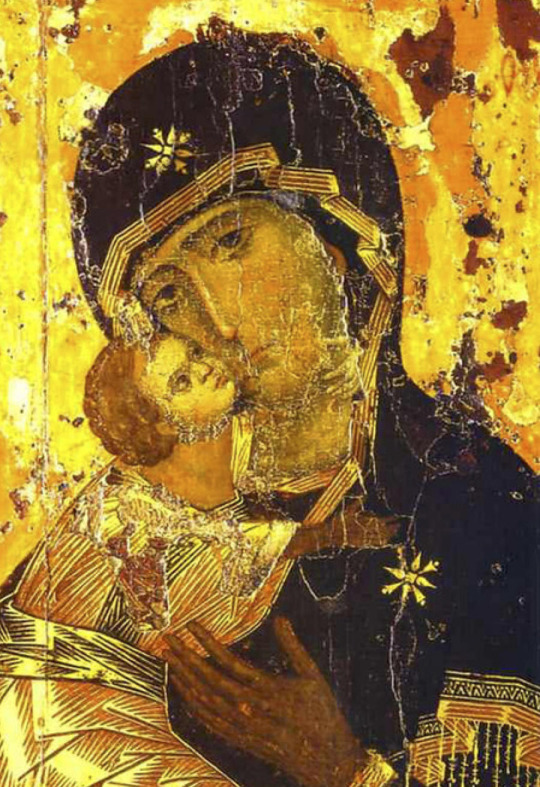
The histories of Moscow and of the icon of Vladimir Mother of God are eternally inseparable. How many times did the Mother of God save the capital city from enemies through the grace of her holy icon? This icon has linked Apostolic times to Byzantium, Kievan Rus’ to Vladimir Rus’, and later to Muscovy, the Third Rome; as it is said, “there will be no Fourth.” The kingdom of Moscow was formed by divine providence and embraced the mystical ties of ancient empires, historical experience and traditions of other Orthodox peoples. The miracle working Vladimir icon became a symbol of unity and succession.
Words cannot describe this icon; any verbal expression would be hollow compared to the gaze of the Theotokos from her image. This look contains everything – life and death; resurrection, eternity, immortality. According to ancient tradition, the Holy Evangelist, Physician, and Iconographer Luke painted three icons of the Theotokos. When the Most Pure One looked at them, she said: “May the grace of the One Who was born of me, and my grace, be with these Holy Icons.” One of these Icons is now known as the Vladimir icon. This depiction of Our Lady was kept in Jerusalem until 450 AD, after which it was taken to Constantinople. In the first half of twelfth century Luke Chrysoberges, Patriarch of Constantinople, sent the icon (together with the other image of Theotokos, known as “Pirogoschaya”) as a gift to Grand Duke Yuri Vladimirovich Dolgoruky, who placed it in the Vyshgorod convent (near Kiev), an area once belonging to Equal-to-the-Apostles, Grand Duchess Olga. In 1155 Vyshgorod became a possession of Prince Andrew, son of Yuri Dolgoruky.
When prince Andrew decided to return to his homeland in Suzdal, he took this Icon without his father’s permission. As he traveled, he continually served molebens before it. The people of Vladimir-on-Klyazma met their prince with joy. Afterwards the prince wanted to continue on to Rostov, but six and half miles from Vladimir their horses stopped near the Klyazma River, and refused to go any further. Even newly harnessed horses refused to proceed. The astounded Prince Andrew fell weeping in front of the Icon and prayed. Thereafter the Theotokos appeared to him with a scroll in her hand, and ordered to leave Her image in the city of Vladimir, and to build later a monastery on the place of her appearance in honor of her Nativity.
Prince Andrew left the icon in Vladimir, and since 1160 it has been called the “Vladimir” icon. In 1164 Prince Andrew Bogolubsky took this Icon on his campaign against Volga Bulgarians. After the prince went to Confession and took Communion, he prostrated before the image of Theotokos, and said: “All who put their trust in Thee, Our Lady, will not perish!” All the soldiers followed their prince to venerate with tears the miraculous icon, and went to battle with trust in the aid of the Mother of God. The infidels were defeated...continue reading
SYNAXIS OF THE ALL SAINTS OF VLADIMIR
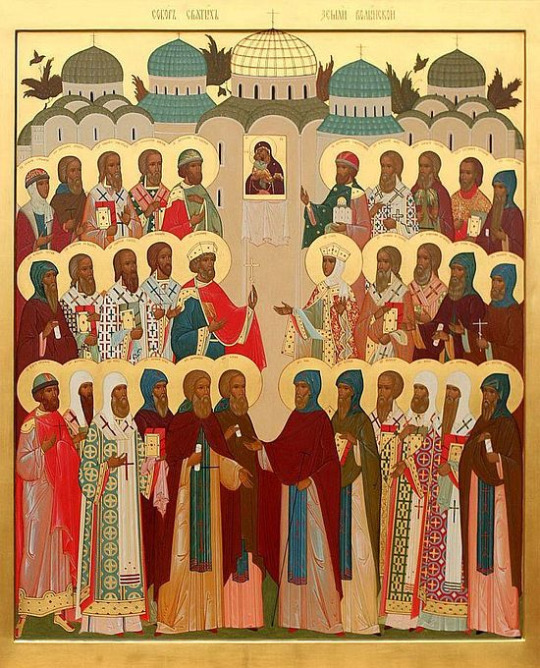
The Synaxis of all Saints of Vladimir is a holiday in honor of the saints of the Russian Orthodox Church, whose life was connected with the territory of the present Eparchy of Vladimir. It is held on June 23, according to the old style, which falls on July 6 for a new style. The synaxis festival was established in 1982 with the blessing of Patriarch Pimen on the day of the celebration of the Theotokos of Vladimir.


LUKE 1:39-49, 56
39. Now Mary arose in those days and went into the hill country with haste, to a city of Judah, 40 and entered the house of Zacharias and greeted Elizabeth. 41 And it happened, when Elizabeth heard the greeting of Mary, that the babe leaped in her womb; and Elizabeth was filled with the Holy Spirit. 42 Then she spoke out with a loud voice and said, "Blessed are you among women, and blessed is the fruit of your womb! 43 But why is this granted to me, that the mother of my Lord should come to me? 44 For indeed, as soon as the voice of your greeting sounded in my ears, the babe leaped in my womb for joy. 45 Blessed is she who believed, for there will be a fulfillment of those things which were told her from the Lord. 46 And Mary said: "My soul magnifies the Lord, 47 And my spirit has rejoiced in God my Savior. 48 For He has regarded the lowly state of His maidservant; For behold, henceforth all generations will call me blessed. 49 For He who is mighty has done great things for me, And holy is His name. 56 And Mary remained with her about three months, and returned to her house.
PHILIPPIANS 2:5-11
5 Let this mind be in you which was also in Christ Jesus, 6 who, being in the form of God, did not consider it robbery to be equal with God, 7 but made Himself of no reputation, taking the form of a bondservant, and coming in the likeness of men. 8 And being found in appearance as a man, He humbled Himself and became obedient to the point of death, even the death of the cross. 9 Therefore God also has highly exalted Him and given Him the name which is above every name, 10 that at the name of Jesus every knee should bow, of those in heaven, and of those on earth, and of those under the earth, 11 and that every tongue should confess that Jesus Christ is Lord, to the glory of God the Father.
2 notes
·
View notes
Text

Translation:
In the constitution of the Republic of Bulgaria it is written that in the Bulgarian family there's a man a woman and children who are boy or girl THERE'S NO sexual relations towards the same sex at short half of Bulgaria violates the constitution
Notes:
I really want to... explain how wrong this person is. I think they are taking the constitutional definition of marriage and trying to apply it to any and every family dynamic?? But also <a man a woman and children who are boy or girl> is funny for two reasons
Bulgarian children are commonly brought up and raised by 2 people of the same sex – mothers and grandmothers (also kindergarten teachers who are, again, only women)
The syntax of <children who are boy or girl> to me implies you can have either only girls or only boys
The <a man a woman and children> goes against traditional Bulgarian family values. Never, let me repeat that, never in our history has the nuclear family been the norm or existed pre-mid 20th century. The concept is so nonexistent, there's no Wikipedia page written/translated on it in Bulgarian. And even if people live away from what is considered their extended family, they aren't considered extended, just family. Unless that part of the family has been cut off or shows little interest in keeping in touch outside of bigger holidays and celebrations or a once in a while phone call, in which case the word used for them are rodà(ta)/рода(та) – (the) family, everyone related to you.
And then we have this gem <THERE'S NO sexual relations towards the same sex>. Bulgaria has not outlawed gay couples so this is bullshit. If a gay couple wants to say they're family, they can. The constitution doesn't say what is or isn't a family. This is once again OP applying marriage/civil union laws to an abstract concept such as family.
And to finish this off, god I wish this was true <at short half of Bulgaria violates the constitution>. I wish half of Bulgaria was queer. I wish at least half of Bulgaria tolerated queerness. I wish at least half of the people who support queerness did so vocally. Alas.
0 notes
Photo
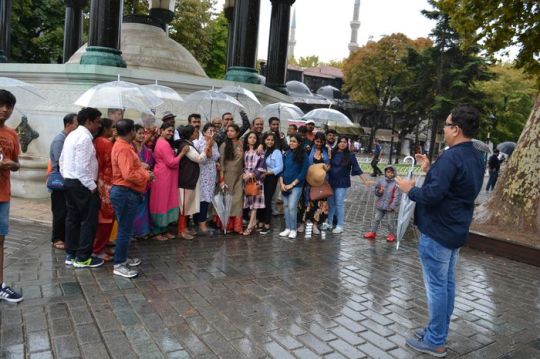
Queen of the Bulgarians
Uncovering the Story of the “Queen of the Bulgarians”
A journey to uncover the truth behind the “Queen of the Bulgarians” reveals unexpected layers of intrigue and tragedy.
Disraeli’s Wit and Turkish Brutality
Disraeli’s astute observation about the Turkish mode of dealing with captives finds grim validation in the fate of these young girls, left abandoned for days on end, a testament to the brutality of their captors Tour Packages Balkan.
A Curious Encounter
In the bustling streets of Philippopolis, tales of a derided “Queen” caught the attention of visitors. Rumored to be imprisoned, she was depicted as a figure of ridicule by the Turks. Intrigued by the mystery surrounding her, a visit was arranged to meet this enigmatic character.
Meeting the Fallen Queen
Led by Dr. Vlados, a Greek physician overseeing the welfare of prisoners, the journey led to a modest dwelling guarded by a stern-faced woman. Upon gaining entry, they encountered a frail figure, presumably the fallen Queen, accompanied by an elder woman, her guardian and protector.
Unraveling the Mystery
The encounter offered a glimpse into the plight of these women, trapped in the web of political upheaval and conflict. As they stood before the visitors, their expressions spoke volumes of their suffering and resilience, shedding light on the human stories buried beneath the layers of political intrigue.
In the heart of Philippopolis, a chance encounter with the “Queen of the Bulgarians” reveals a narrative woven with complexity and sorrow. As the visitors depart, they carry with them the weight of untold stories and the stark reality of human suffering amidst the tumult of history.
0 notes